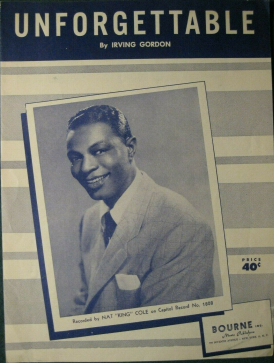"Because" is a song with music and lyrics by Guy d'Hardelot and English lyrics by Edward Teschemacher, originally published in 1902.
"If I Give My Heart to You" is a popular song written by Jimmy Brewster, Jimmie Crane, and Al Jacobs. The most popular versions of the song were recorded by Doris Day and by Denise Lor; both charted in 1954.
"Buttons and Bows" is a popular song with music written by Jay Livingston and lyrics by Ray Evans. The song was published on February 25, 1948 by Famous Music Corp., New York. The song was written for and appeared in the Bob Hope and Jane Russell film The Paleface and won the Academy Award for Best Original Song. It was originally written with an Indian theme, but was changed when the director said that would not work in the movie. It was a vocal selection on many radio programs in late 1948. It was reprised in the sequel, Son of Paleface, by Roy Rogers, Jane Russell and Bob Hope. In 2004 it finished #87 in AFI's 100 Years...100 Songs survey of the top tunes in American cinema.
"Too Young" is a popular song, with music written by Sidney Lippman and lyrics by Sylvia Dee. A recording of the song was released by Nat King Cole in 1951, which reached No. 1 in the United States and became the best-selling song of the year. The song was an early attempt by music labels to appeal to the younger demographics and its success later led to a boom of music that caters to the young. Another successful version was released by Donny Osmond in 1972.
"Red Sails in the Sunset" is a popular song. Published in 1935, its music was written by Hugh Williams with lyrics by prolific songwriter Jimmy Kennedy. The song was inspired by the "red sails" of Kitty of Coleraine, a yacht Kennedy often saw off the northern coast of Northern Ireland and by his adopted town Portstewart, a seaside resort in County Londonderry.
"Pretend" is a popular song, written in 1952 by Dan Belloc, Lew Douglas, Cliff Parman and Frank Levere.
"Chattanoogie Shoe Shine Boy" is a popular song written by Harry Stone and Jack Stapp and published in 1950. It is the signature song of Red Foley who recorded it in late 1949. The song has been covered by many artists, including Bing Crosby, Frank Sinatra, and Faron Young who scored a hit with the song in 1959.

"Unforgettable" is a popular song written by Irving Gordon. The song's original working title was "Uncomparable,” however, the music publishing company asked Gordon to change it to "Unforgettable.” The song was published in 1951.
"I Had the Craziest Dream" is a popular song which was published in 1942. The music was written by Harry Warren, the lyrics by Mack Gordon.
"Managua, Nicaragua" is a popular American song from 1946, whose music was written by Irving Fields, and lyrics by Albert Gamse.
"It's Love, Love, Love" is a popular song whose music was written by Joan Whitney and Alex Kramer, with lyrics by Mack David, and published in 1943.
"It Isn't Fair" is a popular song written by Richard Himber, Frank Warshauer, and Sylvester Sprigato and published in 1933. Isham Jones and His Orchestra had a hit with it the same year.

"Near You" is a popular song written and originally recorded by Francis Craig and His Orchestra at Castle Studio in 1947, with lyrics by Kermit Goell, which has become a pop standard.
"The Old Lamp-Lighter" is a popular song. The music was written by Nat Simon, the lyrics by Charles Tobias. The song was published in 1946.
"You Won't Be Satisfied (Until You Break My Heart)" is a popular song published in 1946.
"I Am in Love" is a 1953 popular song written by Cole Porter, for his musical Can-Can, where it was introduced by Peter Cookson.
"I Apologize" is a popular song written by Al Hoffman, Al Goodhart, and Ed Nelson.
"Lover, Come Back to Me" is a popular song composed by Sigmund Romberg with lyrics by Oscar Hammerstein II for the Broadway show The New Moon, where the song was introduced by Evelyn Herbert and Robert Halliday. The song was published in 1928.
"Trust in Me" is a song written by Ned Wever, Milton Ager, and Jean Schwartz. Popular versions in 1937 were by Mildred Bailey and by Wayne King & his Orchestra.

Unforgettable – A Musical Tribute to Nat King Cole is a soundtrack album released in the UK in 1983 by the CBS Records division of Columbia in conjunction with the broadcast of American pop singer Johnny Mathis's BBC television concert special of the same name that featured Cole's daughter Natalie. The front of the original album jacket credits the concert performers as "Johnny Mathis and Natalie Cole", whereas the CD booklet reads, "Johnny Mathis with special guest Natalie Cole".


